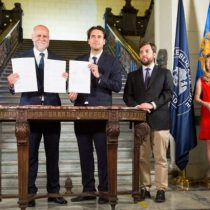
Hannah Arendt points out that understanding a phenomenon implies positioning ourselves from a place of observation and being influenced by the context. It is clear that Chile is going through a process of tectonic rupture. The levels of trust placed by citizens in political and social organization are deteriorating more and more and the expectation that the political class can solve political problems is increasingly distant.
How does the political class understand the crisis process that Chile has been experiencing since October 18, 2019? It does so with agreements, elections, Constitutional Convention and a new agreement that, more than three years after the beginning of the rupture, have not yet managed to resolve anything. A possible answer can be found in the analysis of the two texts with the political agreements reached during this time and through a reading in a philosophical-political key, reading what each one says, but above all what they do not say.
The Agreement for Social Peace and the New Constitution of November 15, 2019 emerged “in the face of the serious political and social crisis of the country attending to the mobilization of citizens.” That is to say: it arises from the protest, but excluding the protest as a valid interlocutor. On the other hand, the current Agreement for Chile is carried out because “it is essential to enable a constituent process and have a new Constitution for Chile.” It was born from the defeat of the previous constitutional proposal, this time excluding the defeated.
While the first agreement promotes the drafting of a new Constitution “through an unquestionably democratic procedure”, the second says nothing in this regard; It does not even mention the word democracy when addressing the process to be implemented. However, it explicitly states in its bases that “Chile is a democratic Republic, whose sovereignty resides in the people.” It is paradoxical that this sovereignty is so protected in this new process. Does sovereignty reside in the people but without the people?
Likewise, between both processes of agreement there are similarities, such as fetishism towards two sociological categories that cross each of the stages of the process, with quasiredemptive features, whose definitions however are opaque: the independent and the experts.
In Chilean politics historically there has been the messianic drive to find those subjects who are going to solve political problems, but there has never been a systematic attempt to integrate and generate a social fabric of a citizenship that thinks politically about its reality. Consequently, we have traveled on a road without destination, under a neoliberal model that promotes a policy more similar to retail than to an activity that thinks the public for the common good.
In the first constituent process: were the independents a guarantee of real independence? In the current process we can ask a similar question: to what extent will experts ensure a successful process? Who will be the experts? Will the experts be the same technocrats of yesteryear, renamed to better present them to the consumer citizen?
Perhaps we can begin to travel a path of overcoming the crisis when the political class understands and begins to listen to the citizens, which is not the same as reading the polls. Otherwise, we run the risk of continuing to be trapped in this vicious circle of propaganda solutions to profound problems of Chilean politics.
Follow us on
The content expressed in this opinion column is the sole responsibility of its author, and does not necessarily reflect the editorial line or position of El Mostrador.
"El reclamo puede ser genuino, pero construido sobre una mentira", apuntó el presidente Javier Milei…
El gobernador de la provincia de Buenos Aires, Axel Kicillof, encabezó un acto en Ensenada…
El diputado nacional de La Libertad Avanza, José Luis Espert, expresó su confianza en la…
Tras la masiva reaparición de Cristina Fernández de Kirchner, el presidente Javier Milei apuntó contra…
El principal propósito de la nueva comisión es evaluar los recursos humanos en el Senado,…
En una medida que busca redefinir las condiciones de los seguros de automóviles en Argentina,…
Esta web usa cookies.